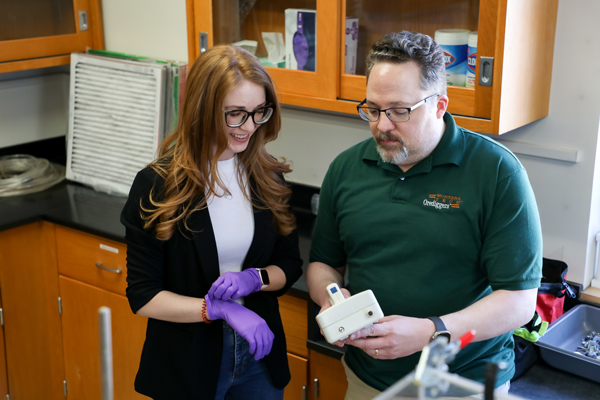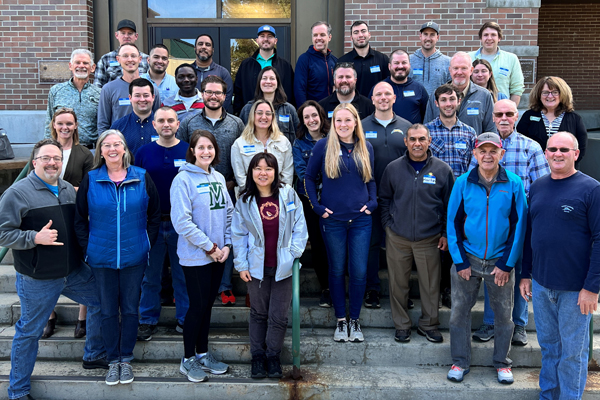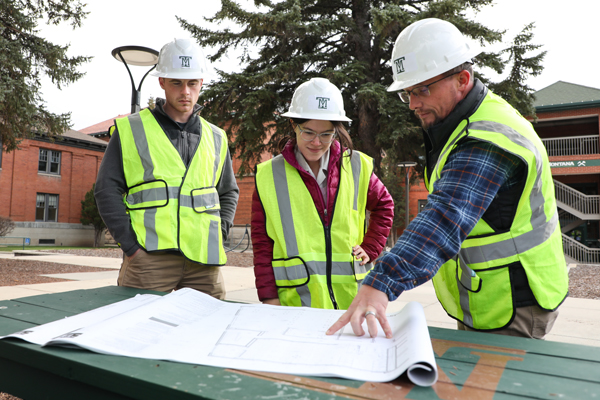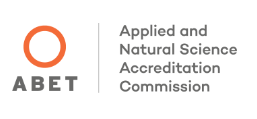
Occupational Safety and Health, B.S.
Fulfill an ever-increasing demand for occupational safety and industrial hygiene specialists within industries ranging from alternative energy to insurance.
Why Study Occupational Safety and Health at Montana Tech?
Occupational Safety and Health (OSH) graduates apply science, engineering, and technology to anticipate, recognize, evaluate, and control safety and health hazards in the workplace. From protecting people from acute injury or death due to traumatic accidents, to preventing illness and chronic disease due to biological, chemical, and physical agents, OSH graduates are the experts in ensuring that everyone has access to a safe and healthy work environment. Employed as Environmental Health and Safety Specialists, Safety Engineers, and Safety Managers, OSH graduates join a rapidly growing and in-demand group of dedicated professionals protecting our workers and their families. Students who enjoy the sciences, conducting field work in interesting environments, and frequent interactions with a diverse group of people should consider the rewarding field of occupational safety and health.
What Do Safety Professionals Do? - American Society of Safety Professionals
State-of-the-Art Facilities
Montana Tech recently constructed a state-of-the-art Safety Lab which allows for an abundance of experiential learning exercises within the curriculum. These experiences, coupled with a professional internship ensure that students are career-ready upon graduation.
Nationally Recognized Program
I came for a visit and fell in love with campus. I also fell in love with occupational health and safety. It checked all my boxes: being able to work with people, being able to problem solve, having a science aspect. I learned you could work anywhere and in any field.
Megan Benton 2024 OSH Graduate
Campus Activities and Student Clubs
Our American Society of Safety Professionals (ASSP) student club is one of the most active student groups on campus. The ASSP club provides an opportunity for students of all levels to engage in campus events and to give back to the community. Students also participate in regional and national professional societies through the ASSP club, and they have been very successful in securing external scholarships through these groups.
Accelerated Masters Program for Undergraduate Students
Qualified Montana Tech undergraduates have the opportunity to receive an MS in Industrial Hygiene degree at an accelerated pace by getting a jump start on required graduate coursework. Students accepted into the program will incorporate graduate-level coursework into the undergraduate curriculum and there is the opportunity to count up to 9 undergraduate credit hours toward the graduate degree. Students can typically complete all remaining graduate requirements in 1 year after finishing their undergraduate degree.
What Kinds of Jobs Do Occupational Safety and Health Graduates Get?
Diverse employers visit the campus to recruit students for internships and career positions. More than half of the graduates start their career in industrial sectors such as construction, mining, or energy; many others start with federal, state, other governmental agencies. Nearly all large industrial companies and governmental agencies have OSH programs with career ladders providing opportunities for promotions and increased salary.
For Occupational Health and Safety Specialists and Technicians, 2023
Explore Classes in Occupational Safety and Health
Montana Tech’s program in Occupational Safety and Health (OSH) leads to a Bachelor of Science (B.S.) degree. Nearly all graduates have rewarding careers as OSH professionals working in positions aimed at helping employees perform their work safely in a workplace free from recognized hazards. Core functions for OSH professionals include developing, implementing, and evaluating health and safety programs.
The curriculum provides students a sound technical foundation with courses in mathematics, biology, chemistry, and physics. Communication skills are strengthened through courses in writing and oral presentation. Of the 122 total required credit hours, 45 are in OSH. Most of these include experiences working in small groups, writing assignments, presentations, and problem solving. Laboratory courses conducted by OSH faculty use three laboratories, one is unique and dedicated to safety and ergonomics.
Meet faculty, explore our research expertise, and more.
Explore Program Educational Objectives and Student Outcomes for the B.S. OSH program.
Get semester-by-semester info about Occupational Safety and Health courses.

The on-campus M.S. degree is structured to encourage participative, collaborative, and applied problem-solving strategies to address modern day occupational health issues.

The distance M.S. degree is structured to encourage participative, collaborative, and applied problem-solving strategies to address modern day occupational health issues. Working professionals can obtain education in industrial hygiene with the overall goal of providing the technical competence to anticipate, recognize, evaluate, and control occupational health hazards.

Learn the various aspect of construction projects, such as scheduling, cost estimating and accounting, CAD, safety, human resources, machinery, and regulatory compliance, through our new bachelor’s degree in construction management.
We can answer your questions and help you get started.
Associate Professor
lbirkenbuel@mtech.edu
406-496-4290


